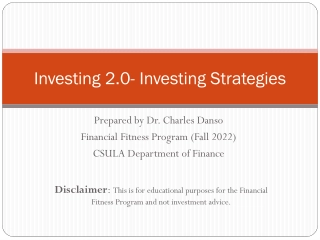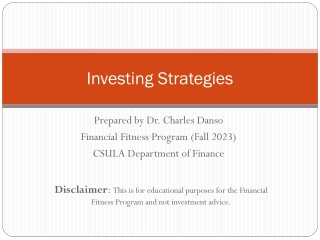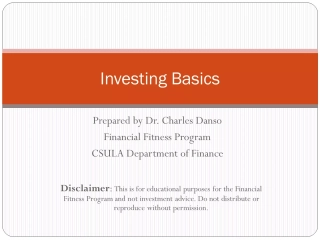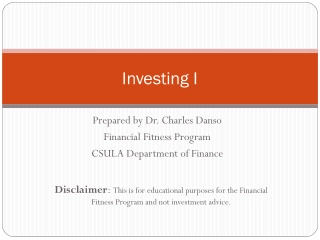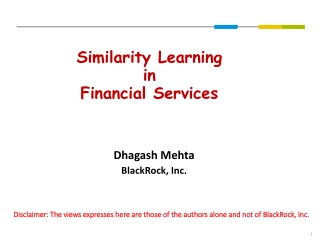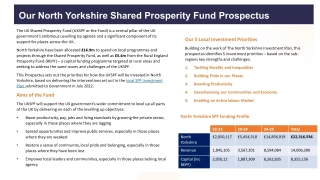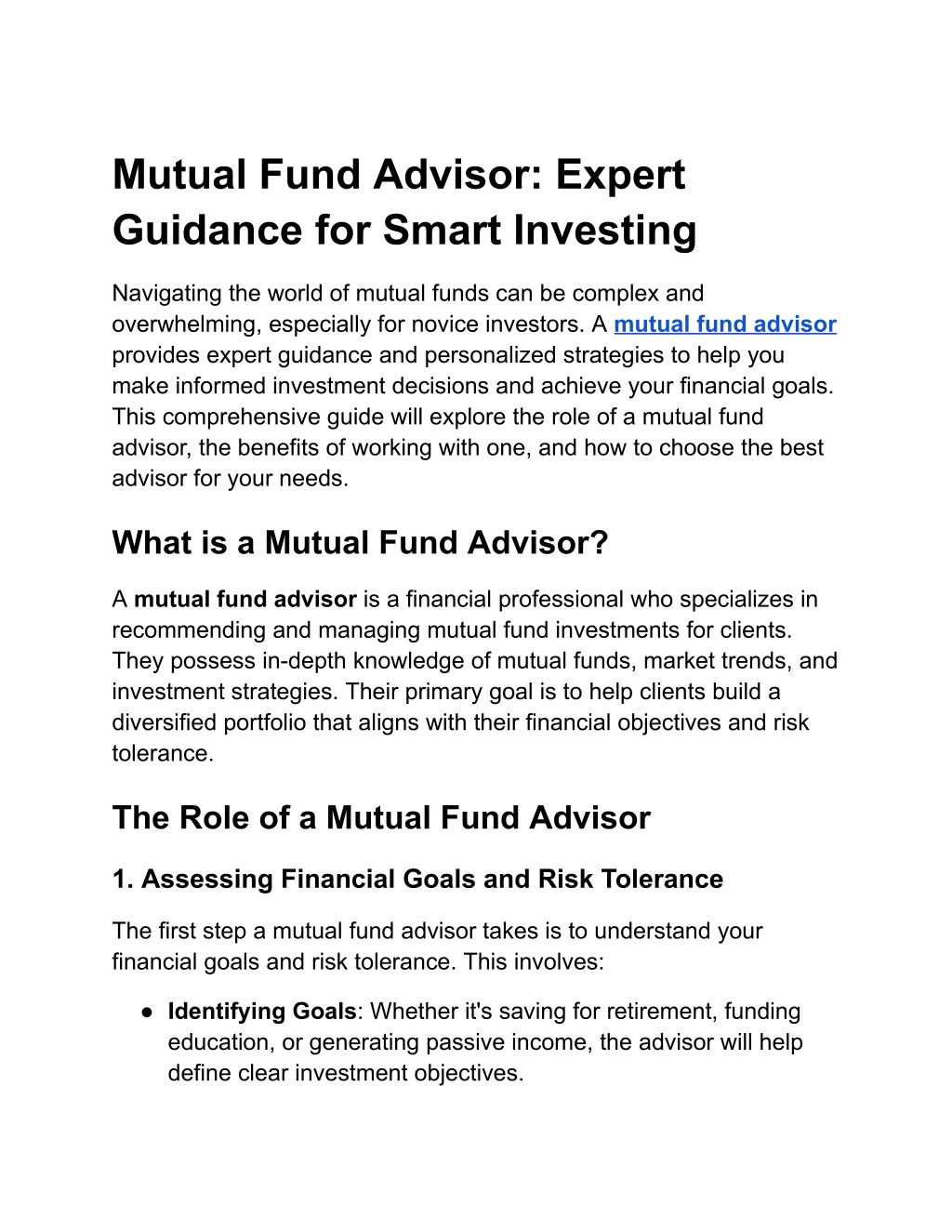
Mutual Fund Advisor_ Expert Guidance for Smart Investing
Navigating the world of mutual funds can be complex and overwhelming, especially for novice investors. A mutual fund advisor provides expert guidance and personalized strategies to help you make informed investment decisions and achieve your financial goals. This comprehensive guide will explore the role of a mutual fund advisor, the benefits of working with one, and how to choose the best advisor for your needs.
Uploaded on | 2 Views
Download Presentation
Please find below an Image/Link to download the presentation.
The content on the website is provided AS IS for your information and personal use only. It may not be sold, licensed, or shared on other websites without obtaining consent from the author. Download presentation by click this link. If you encounter any issues during the download, it is possible that the publisher has removed the file from their server.
Presentation Transcript
Mutual Fund Advisor: Expert Guidance for Smart Investing Navigating the world of mutual funds can be complex and overwhelming, especially for novice investors. A mutual fund advisor provides expert guidance and personalized strategies to help you make informed investment decisions and achieve your financial goals. This comprehensive guide will explore the role of a mutual fund advisor, the benefits of working with one, and how to choose the best advisor for your needs. What is a Mutual Fund Advisor? A mutual fund advisor is a financial professional who specializes in recommending and managing mutual fund investments for clients. They possess in-depth knowledge of mutual funds, market trends, and investment strategies. Their primary goal is to help clients build a diversified portfolio that aligns with their financial objectives and risk tolerance. The Role of a Mutual Fund Advisor 1. Assessing Financial Goals and Risk Tolerance The first step a mutual fund advisor takes is to understand your financial goals and risk tolerance. This involves: Identifying Goals: Whether it's saving for retirement, funding education, or generating passive income, the advisor will help define clear investment objectives.
Evaluating Risk Tolerance: Determining how much risk you are comfortable with is crucial for selecting suitable mutual funds. Advisors use detailed discussions and risk assessment tools to gauge this. 2. Developing a Customized Investment Plan Based on your financial goals and risk tolerance, the mutual fund advisor creates a tailored investment plan. This plan outlines the recommended mutual funds, asset allocation, and investment strategy designed to achieve your desired outcomes. 3. Selecting Appropriate Mutual Funds The advisor conducts thorough research to identify mutual funds that match your investment criteria. They consider factors such as: Fund Performance: Analyzing historical returns and comparing them with benchmarks. Fund Manager's Track Record: Evaluating the experience and performance history of the fund manager. Expense Ratios: Assessing the costs associated with the mutual fund, including management fees and other expenses. Fund Objectives and Holdings: Ensuring the fund's objectives align with your goals and reviewing the underlying assets. 4. Providing Ongoing Monitoring and Adjustments A mutual fund advisor continuously monitors the performance of your mutual funds and overall portfolio. They make adjustments as needed to ensure the investment plan remains aligned with your goals. This includes:
Periodic Reviews: Regularly reviewing the portfolio to track progress and make necessary changes. Rebalancing: Adjusting the asset allocation to maintain the desired level of risk and return. Market Updates: Keeping you informed about market trends and potential impacts on your investments. 5. Offering Expert Advice and Education Mutual fund advisors provide valuable insights and education to help you make informed investment decisions. They explain complex investment concepts in simple terms and offer advice on various financial matters, such as tax implications and retirement planning. Benefits of Working with a Mutual Fund Advisor 1. Expertise and Knowledge Mutual fund advisors possess extensive knowledge of mutual funds, market dynamics, and investment strategies. Their expertise enables them to provide well-informed advice and identify the best investment opportunities. 2. Personalized Advice Advisors offer personalized investment advice tailored to your unique financial situation and goals. This personalized approach ensures that the investment plan is specifically designed to meet your needs.
3. Time Savings Researching and selecting mutual funds can be time-consuming. A mutual fund advisor handles this process, saving you time and effort. You can focus on other aspects of your life while the advisor manages your investments. 4. Risk Management Advisors help you manage investment risks by developing diversified portfolios and implementing appropriate risk management strategies. This helps protect your investments from significant losses. 5. Peace of Mind Working with a mutual fund advisor provides peace of mind, knowing that a professional is managing your investments. You can feel confident that your financial goals are being pursued with expertise and diligence. How to Choose the Best Mutual Fund Advisor 1. Qualifications and Experience Look for an advisor with relevant qualifications and experience. Credentials such as Certified Financial Planner (CFP) or Chartered Financial Analyst (CFA) indicate a high level of expertise. Additionally, consider the advisor's experience in advising clients on mutual fund investments.
2. Reputation and Track Record Research the advisor's reputation and track record. Look for reviews, testimonials, and case studies to gauge their success in helping clients achieve their financial goals. An advisor with a proven track record is more likely to provide reliable advice. 3. Communication Skills Effective communication is crucial for a successful client-advisor relationship. Choose an advisor who listens to your needs, explains investment concepts clearly, and keeps you informed about your portfolio's performance. 4. Fee Structure Understand the advisor's fee structure and ensure it aligns with your budget. Advisors may charge fees based on a percentage of assets under management, hourly rates, or flat fees. Choose a fee structure that provides value for the services offered. 5. Personalized Approach Select an advisor who offers a personalized approach to investment advice. Avoid advisors who use a one-size-fits-all strategy. Your financial situation and goals are unique, and your investment plan should reflect that.
The Importance of a Mutual Fund Advisor A mutual fund advisor can be an invaluable partner in your investment journey, providing expert advice, personalized strategies, and ongoing support to help you achieve your financial goals. They help you navigate the complex world of mutual funds with confidence and build a robust investment portfolio. Conclusion Choosing the best mutual fund advisor is essential for your financial success. By assessing your needs, researching your options, and seeking professional advice, you can find an advisor who offers the guidance and support necessary to make smart investment decisions. Regularly reviewing and updating your investment plan ensures that it remains aligned with your changing needs and market conditions.






